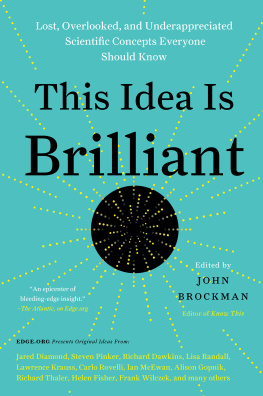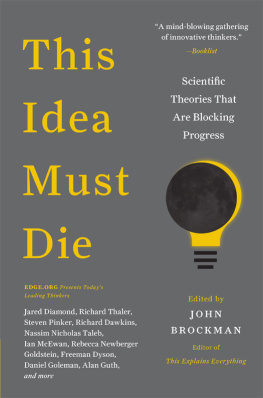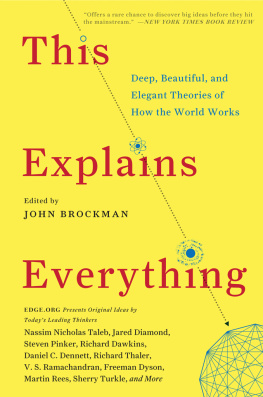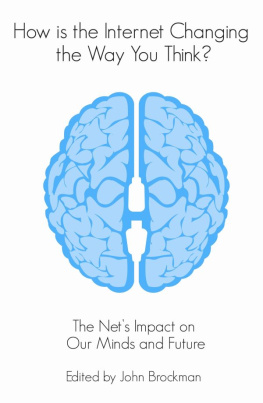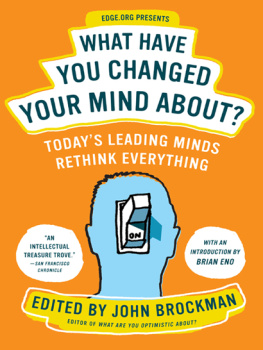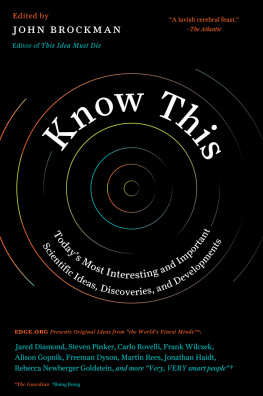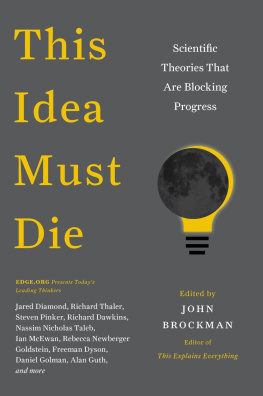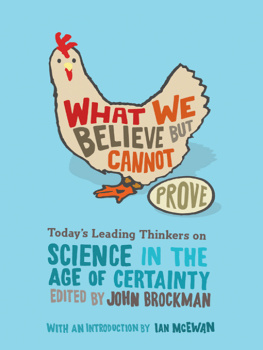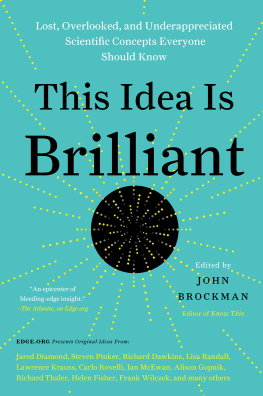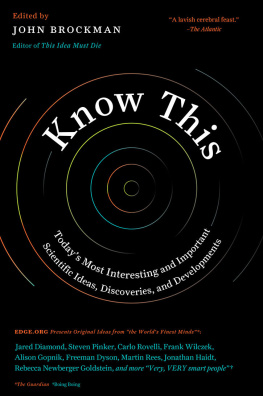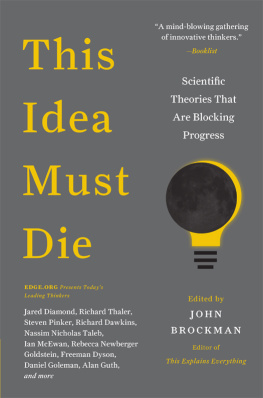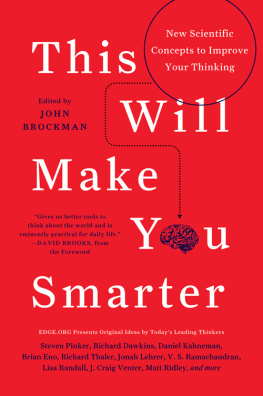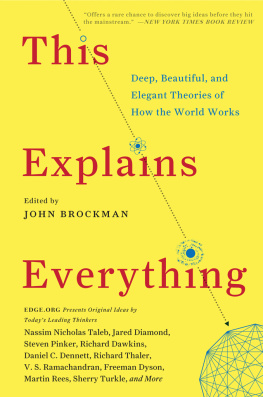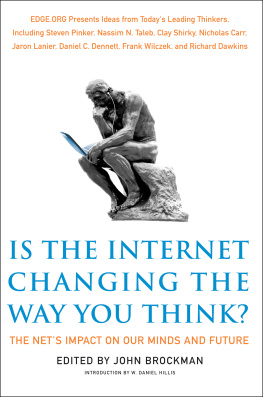Brockman - This Idea Is Brilliant
Here you can read online Brockman - This Idea Is Brilliant full text of the book (entire story) in english for free. Download pdf and epub, get meaning, cover and reviews about this ebook. year: 2018, publisher: HarperCollins, genre: Romance novel. Description of the work, (preface) as well as reviews are available. Best literature library LitArk.com created for fans of good reading and offers a wide selection of genres:
Romance novel
Science fiction
Adventure
Detective
Science
History
Home and family
Prose
Art
Politics
Computer
Non-fiction
Religion
Business
Children
Humor
Choose a favorite category and find really read worthwhile books. Enjoy immersion in the world of imagination, feel the emotions of the characters or learn something new for yourself, make an fascinating discovery.
- Book:This Idea Is Brilliant
- Author:
- Publisher:HarperCollins
- Genre:
- Year:2018
- Rating:4 / 5
- Favourites:Add to favourites
- Your mark:
- 80
- 1
- 2
- 3
- 4
- 5
This Idea Is Brilliant: summary, description and annotation
We offer to read an annotation, description, summary or preface (depends on what the author of the book "This Idea Is Brilliant" wrote himself). If you haven't found the necessary information about the book — write in the comments, we will try to find it.
This Idea Is Brilliant — read online for free the complete book (whole text) full work
Below is the text of the book, divided by pages. System saving the place of the last page read, allows you to conveniently read the book "This Idea Is Brilliant" online for free, without having to search again every time where you left off. Put a bookmark, and you can go to the page where you finished reading at any time.
Font size:
Interval:
Bookmark:
In Memory of My Brother
PHILIP BROCKMAN
Rocket Scientist
19372017
I began a true rocket scientist.
At the end I conducted research toward making aircraft safer for us all.
I am a man of wind and light.
Richard Dawkins meme became a meme, known far beyond the scientific conversation in which it was coined. It is one of a handful of scientific ideas that have entered the general culture, helping to clarify and inspire. Of course, not everyone likes the idea of spreading scientific understanding. The Bishop of Birminghams wife is reputed to have said, about Darwins claim that human beings are descended from monkeys: My dear, let us hope it is not true, but, if it is true, let us hope it will not become generally known.
Of all the scientific terms or concepts that ought to be more widely known, in order to inspire and expand science-minded thinking in the general culture, perhaps none are more important than science itself.
Many people, even many scientists, harbor a narrow view of scienceas controlled, replicated experiments performed in the laboratory and consisting quintessentially of physics, chemistry, and molecular biology. The essence of science, however, is best conveyed by its Latin etymology: scientia, meaning knowledge.
The scientific method is simply that body of practices best suited for obtaining reliable knowledge. The practices vary among fields: the controlled laboratory experiment is possible in molecular biology, physics, and chemistry, but it is either impossible, immoral, or illegal in many other fields customarily considered scientific, including all of the historical sciences: astronomy, epidemiology, evolutionary biology, most of the Earth sciences, and paleontology. If the scientific method can be defined as those practices best suited for obtaining knowledge in a particular field, then science itself is simply the body of knowledge obtained by those practices.
Science (that is, reliable methods for obtaining knowledge) is an essential part of psychology and the social sciences, tooespecially economics, geography, history, and political science. Along with the broad observation-based and statistical methods of the historical sciences, detailed techniques of such conventional sciences as chemistry and genetics are proving essential for tackling problems in the social sciences. Science, then, is the reliable acquisition of knowledge about anything, whether it be the vagaries of human nature, the role of great figures in history, or the origins of life itself.
It is in this spirit of scientia that Edge, on the occasion of its 20th anniversary, is pleased to present the Edge Annual Question for 2017:
WHAT SCIENTIFIC TERM OR CONCEPT OUGHT TO BE MORE WIDELY KNOWN?
Happy New Year!
John Brockman
Publisher & Editor, Edge
Physicist; entrepreneur and venture capitalist; science philanthropist
In 1977, the Voyager probes were launched toward the outer solar system, each carrying a golden record containing hundreds of sounds and images, from the cry of a newborn baby to the music of Beethoven. In the emptiness of space, they could last for millions of years. By that time, will they be the sole representatives of human culture in the cosmos? Or primitive relics of a civilization that has since bloomed to the galactic scale?
The Drake equation estimates the number of currently communicative civilizations in the Milky Way by multiplying a series of terms, such as the fraction of stars with planets and the fraction of inhabited planets on which intelligence evolves. The final term in the equation doesnt get much attention. Yet its crucial, not just for the question of intelligent life but also for the question of how to live intelligently. This is L, the longevity factor, and it represents the average life span of a technological civilization.
What determines this average? Surely the intelligence of the civilizations. The list of existential threats to humanity includes climate change, nuclear war, pandemics, asteroid collisions, and perhaps artificial intelligence. And all of these threats can be avoided. Some can be addressed here on Earth; others require activity in space, but with the ultimate aim of protecting the planet.
In 1974, Princeton physicist Gerard K. ONeill published a paper, The Colonization of Space, which led to the first conference on the subject, sponsored by Princeton and Stewart Brands Point Foundation, and to ONeills highly influential 1976 book, The High Frontier. That has been an inspiration for the current generation of visionaries, who advocate steps such as the transfer of heavy industry into orbit, where it can run on solar energy and direct its heat and waste away from Earth, and the colonization of Mars.
However powerful our local solutions, betting everything on one planet would be imprudent. Stephen Hawking has estimated: Although the chance of a disaster to planet Earth in a given year may be quite low, it adds up over time, and becomes a near certainty in the next 1,000 or 10,000 years. By that time we should have spread out into space,... In the long term, Mars must be a stepping-stone to more distant destinations, because two adjacent planets could be simultaneously affected by the universes more violent events, such as a nearby supernova. We need to start thinking at the galactic level. The first target might be the Earth-size planet Proxima b, recently discovered orbiting the nearest star to the sun, 4.2 light-years away. Sooner rather than later, well have to master propulsion fast enough to make interstellar journeys practical. Perhaps by that time well have developed beyond our organic origins. It has been estimated that von Neumann probesrobots that can land on a planet, mine local materials, and replicate themselvescould colonize the entire galaxy within 10 million years.
But even a galactic civilization might face existential threats. According to our current understanding of the laws of physics, in any region of space theres a chance that a death bubble forms and then expands at speeds approaching the speed of light. Because the physics inside the bubble would differ from that of ordinary space, as it expanded it would destroy all matter, including life. The chances of this happening in a given year may seem extremely lowperhaps less than 1 in 10 billion. But as Hawking reminded us, if you wait long enough the improbable is inevitable.
Yet the renowned physicist Ashoke Sen has recently suggested that even in the face of death bubbles there might be an escape route. The loophole is the accelerating expansion of the universe. In 1998, astronomers discovered that all galaxies not strongly bound together by gravity are moving apart ever faster. This accelerating expansion will eventually carry them beyond one anothers cosmic horizonso far that even light from one can never reach another. Thus they can no longer communicatebut, on the bright side, they can also never be swallowed by the same death bubble.
So by splitting into daughter civilizations and putting as much distance between them as possible, a civilization could ride the expansion of the universe to relative safety. Of course, another death bubble will eventually pop up within any cosmic horizon, so the remaining civilizations need to keep replicating and parting ways. Their chances of survival depend on how far they can travel: If they can move at a substantial fraction of the speed of light, theyll raise their chances of survival considerably. But even those that dispersed only far enough not to be bound by another galaxys gravityabout 5 million light-yearsmight significantly improve their odds.
Such problems may seem remote. But theyll be real to our descendants, if we can survive long enough to allow those descendants to exist. Our responsibility as a civilization is to keep going for as long as the laws of physics allow.
Font size:
Interval:
Bookmark:
Similar books «This Idea Is Brilliant»
Look at similar books to This Idea Is Brilliant. We have selected literature similar in name and meaning in the hope of providing readers with more options to find new, interesting, not yet read works.
Discussion, reviews of the book This Idea Is Brilliant and just readers' own opinions. Leave your comments, write what you think about the work, its meaning or the main characters. Specify what exactly you liked and what you didn't like, and why you think so.

